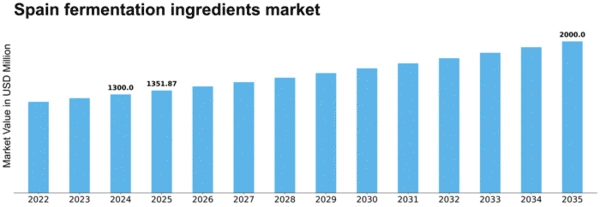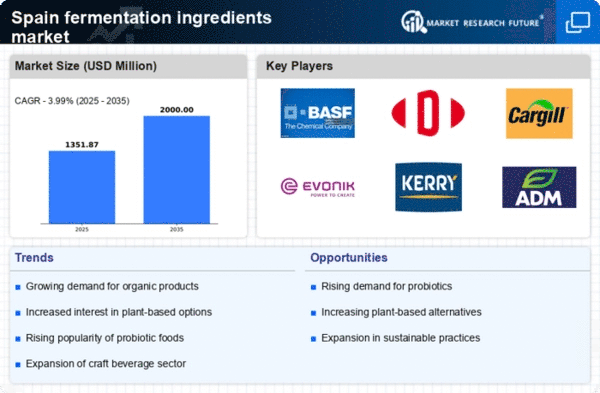Spain Fermentation Ingredients Size
Spain Fermentation Ingredients Market Growth Projections and Opportunities
The fermentation ingredients market in Spain is influenced by several key factors that shape its dynamics and growth trajectory. Firstly, Spain's rich agricultural heritage plays a significant role in supplying raw materials for fermentation. With a diverse range of crops including grapes, olives, and citrus fruits, Spain provides ample resources for fermentation processes. This abundance of agricultural produce ensures a steady supply of ingredients such as sugars, starches, and organic acids necessary for fermentation.
Moreover, the growing consumer preference for natural and healthy food products has spurred the demand for fermented foods and beverages in Spain. Fermentation is perceived as a natural preservation method that enhances the nutritional value and flavor of food products. As a result, there is an increasing market for fermented dairy products like yogurt and cheese, as well as fermented beverages such as wine and beer in Spain.
Additionally, economic factors such as disposable income and consumer spending patterns influence the fermentation ingredients market in Spain. As the economy grows and consumers have more purchasing power, there is a greater willingness to spend on premium and specialty fermented products. This trend is particularly evident in the wine industry, where consumers are willing to pay higher prices for quality wines made from carefully fermented grapes.
Furthermore, regulatory factors play a crucial role in shaping the fermentation ingredients market in Spain. Compliance with food safety standards and regulations set by the European Union (EU) ensures the quality and safety of fermented products. Strict adherence to these regulations is necessary for market players to gain consumer trust and maintain a competitive edge in the market.
Moreover, technological advancements and innovations in fermentation processes have a significant impact on the market dynamics in Spain. Advancements in biotechnology and microbial strains have enabled more efficient and controlled fermentation processes, leading to higher yields and improved product quality. This has not only reduced production costs but also widened the range of fermented products available in the market.
Furthermore, changing consumer preferences and dietary habits drive innovation in the fermentation ingredients market. As consumers become more health-conscious, there is a growing demand for probiotic-rich fermented foods that promote gut health. This has led to the development of a variety of fermented products such as kombucha, kefir, and kimchi, which are gaining popularity among health-conscious consumers in Spain.
Additionally, globalization and international trade play a significant role in the fermentation ingredients market in Spain. The country's participation in the global economy allows access to a wide range of fermentation ingredients and technologies from around the world. This facilitates innovation and diversification within the market, as companies can leverage international resources to develop new products and expand their offerings.



















Leave a Comment